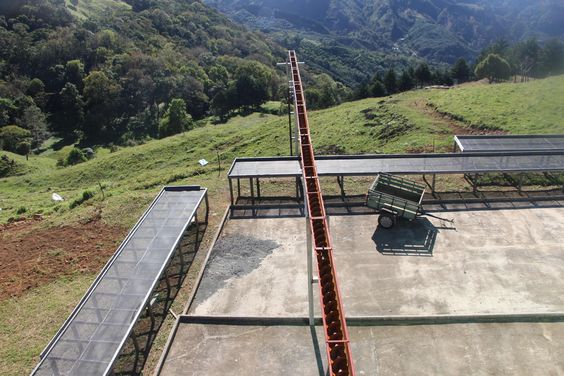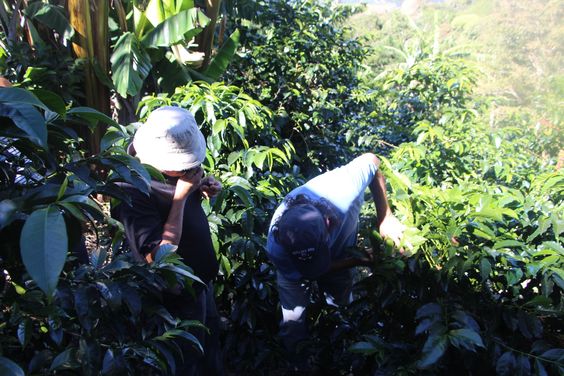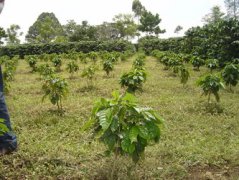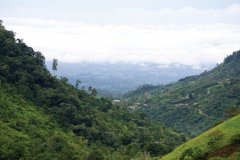Costa Rican Tarazu Coffee Gangguo Santa Teresa Congo Santa Teresa Honey to treat Rose Summer

For professional baristas, please follow the coffee workshop (Wechat official account cafe_style)
This is a rose summer treated with honey. Roger Ureina, a coffee farmer from Tarazu, has a 2-hectare farm specializing in rose summer and seedlings from Pokuit, Panama. Ureena is one of only a small number of coffee farmers in Costa Rica who are willing to take a high risk to grow rose summer.
Roger Roger Urena grew coffee from an early age and worked full-time at the age of 15, but although he had been growing coffee for a long time, until two years ago, he was so unsustainable that the co-operative that bought his coffee cherries was so unsustainable that he decided to build his own processing plant, Santa Teresa.
Six years ago, Ureina bought St. Teresa Farm, a total of 60 hectares, very high above sea level, between 1900 and 2015 meters, of which he used only 9 hectares to grow coffee and the rest to maintain virgin forests. Unlike Catuai and Kaddura, which are grown by the average coffee farmer in Costa Rica, Ureina believes that there is a market for special beans, so he dares to take risks to plant rare beans, including Rume Sudan, Pacamara, Bourbon, Villalobos and Geisha, as well as some locals named Typica Mejorado, which is actually Rosa.
His rose summer is mainly planted in small farm land "Congo", which is only 2 hectares in size. The cherries are harvested and sent to St. Teresa's treatment plant, where the peel and pulp are removed by Penagos ecological peeling machine (eco pulper), and the post-processing is mainly treated with honey and washing. Drying is placed in an African viaduct bed or tanning field. The rarer varieties are dried in an elevated bed for 10-15 days until it is dried to the appropriate moisture content.

Treatment of Costa Rican Gangguo San Teresa Rose Summer Honey
Costa Rica Congo Santa Teresa Geisha honey
Country of production: Costa Rica, Costa Rica
Producing area: Tarazhu Tarrazu
Farm: Gongo / St. Teresa Congo Santa Teresa
Washing plant: St. Teresa washing plant Santa Teresa
Farmer: Roger Urena
Altitude: 1900 m
Bean seed: rose summer Geisha
Treatment method: honey-treated Honey
Harvest time: 2017
Important Notice :
前街咖啡 FrontStreet Coffee has moved to new addredd:
FrontStreet Coffee Address: 315,Donghua East Road,GuangZhou
Tel:020 38364473
- Prev

An overview of Costa Rican coffee beans the relationship between the origin and quality of Costa Rican coffee
Communication of professional baristas Please pay attention to the coffee workshop (Wechat official account cafe_style) the coffee beans produced in the high latitudes of Costa Rica are famous in the world, full-bodied, mild in taste, but extremely sour, and the coffee beans here are carefully processed, which is why there is high quality coffee. Costa Rica is located in SanJos, the capital of the State of Tarasu.
- Next

Kaddura was treated with Senel Campos honey in Cecilia Coffee region of Costa Rica
Professional baristas follow the coffee shop (Wechat official account cafe_style) Coffee farmers in Costa Rica's Brunca region, who have traditionally belonged to cooperatives, with the exception of Senel Campos, whose first microbatch last year distinguished his batches from the cooperative's products. Three years ago, he built it out of his own pocket.
Related
- Detailed explanation of Jadeite planting Land in Panamanian Jadeite Manor introduction to the grading system of Jadeite competitive bidding, Red bid, Green bid and Rose Summer
- Story of Coffee planting in Brenka region of Costa Rica Stonehenge Manor anaerobic heavy honey treatment of flavor mouth
- What's on the barrel of Blue Mountain Coffee beans?
- Can American coffee also pull flowers? How to use hot American style to pull out a good-looking pattern?
- Can you make a cold extract with coffee beans? What is the right proportion for cold-extracted coffee formula?
- Indonesian PWN Gold Mandrine Coffee Origin Features Flavor How to Chong? Mandolin coffee is American.
- A brief introduction to the flavor characteristics of Brazilian yellow bourbon coffee beans
- What is the effect of different water quality on the flavor of cold-extracted coffee? What kind of water is best for brewing coffee?
- Why do you think of Rose Summer whenever you mention Panamanian coffee?
- Introduction to the characteristics of authentic blue mountain coffee bean producing areas? What is the CIB Coffee Authority in Jamaica?

